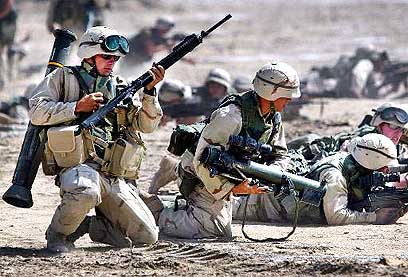
Doug Feith: Israel didn't push for Iraq War
Former US undersecretary of defense tells Ynet he never saw evidence of Israeli pressure on America to launch Iraq War. In private conversations, Israelis warned that Iraq failure could undermine effort against Iran, he says
WASHINGTON - As opposed to frequently cited claims, Israeli officials did not push their American counterparts into launching a war in Iraq, Former United Stated Undersecretary of Defense Douglas Feith told Ynet in a special interview.
Addressing claims that Israel pushed the US Administration into the war, Feith said "I never saw that."
"What you heard from Israeli officials in private discussions was that they were not really focused on Iraq," Feith said. "They were much more focused on Iran."

US troops in Iraq. (Photo: AP)
When asked why Israel did not publically object to military action in Iraq, he said this was a result of the strong relationship between Israeli officials and the Bush Administration.
"The relationship between Bush and Israel was so strong and so friendly that the Israeli government was not going to join Germany and French in opposing the US," Feith said, and added that "what you heard from the Israelis was not any kind of advocacy of war with Iraq."
Feith said that he heard "constant (Israeli) emphasis on the importance of the Iran danger" and added that Israel was worried about a scenario that ended up materializing, namely that "if the US got into a military conflict in Iraq and it didn’t go well, it could make our diplomacy with Iran less credible."
'People were looking for ways short of war'
Feith, whose new book War and Decision aims to present his take on the Iraq War, also dismissed claims that the Bush Administration had its mind set on war in Iraq even before the September 11 attacks.
"A lot of the decisions came after September 11th," he told Ynet. "I think one of the things the book explains is that Iraq was a major issue before September 11th - it was a major issue since 1990 for the US, and there was a debate within the US government on what to do about Iraq."
"After all, you had the Iraq Liberation Act in 1998, which said the US policy is regime change, the Senate passed that law unanimously, and President Clinton signed it," he added.
"I review the debates inside the administration on what to do about Iraq and what I point out is that no decisions were made," Feith said, referring to his book. "There were debates about the no-fly zone enforcement, strengthening economic sanctions, and the CIA had been talking about the possibility of a coup. There were debates about whether we can create an autonomous enclave in the south… people were looking for ways short of war to deal with the problem."
Feith also rejected suggestions that the Bush Administration chose to target Iraq because it was the easiest move at the time.
"I don't think it was the easiest," he said. "We looked at each of the states supporting terror, and we said we need a policy appropriate to that country. In the case of Iran and North Korea, it was clear that before anyone could even consider any military action there was important diplomacy that had to be tried."
"At the time the UN was dealing with Iraq for 12 years," Feith said, and added that "the risks of leaving Saddam Hussein in power were very serious."










